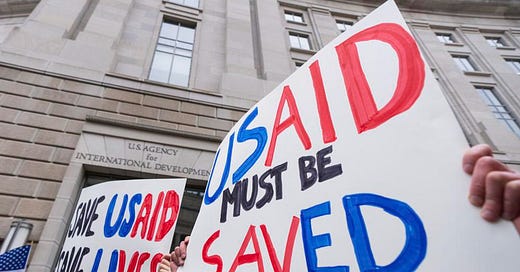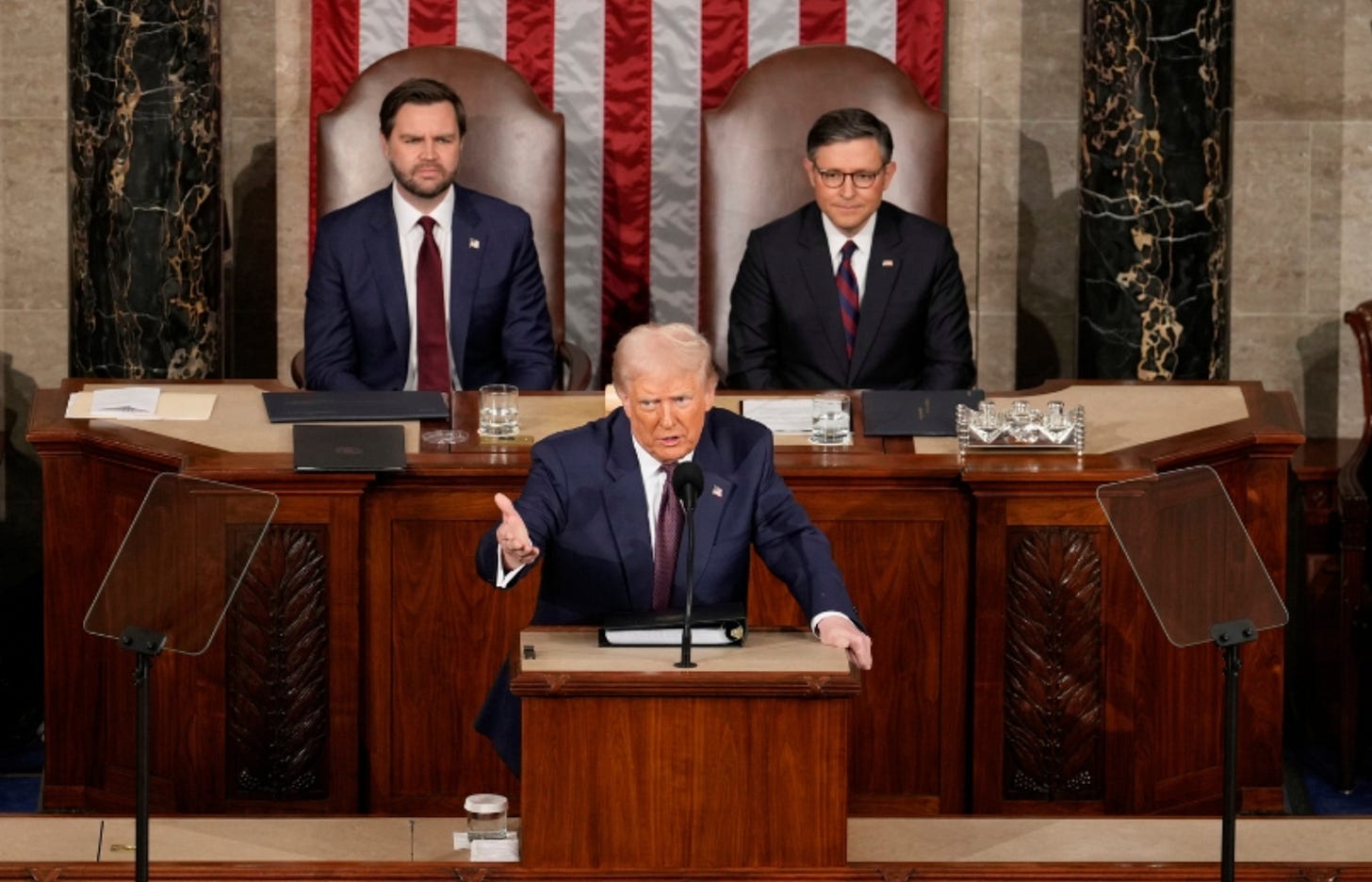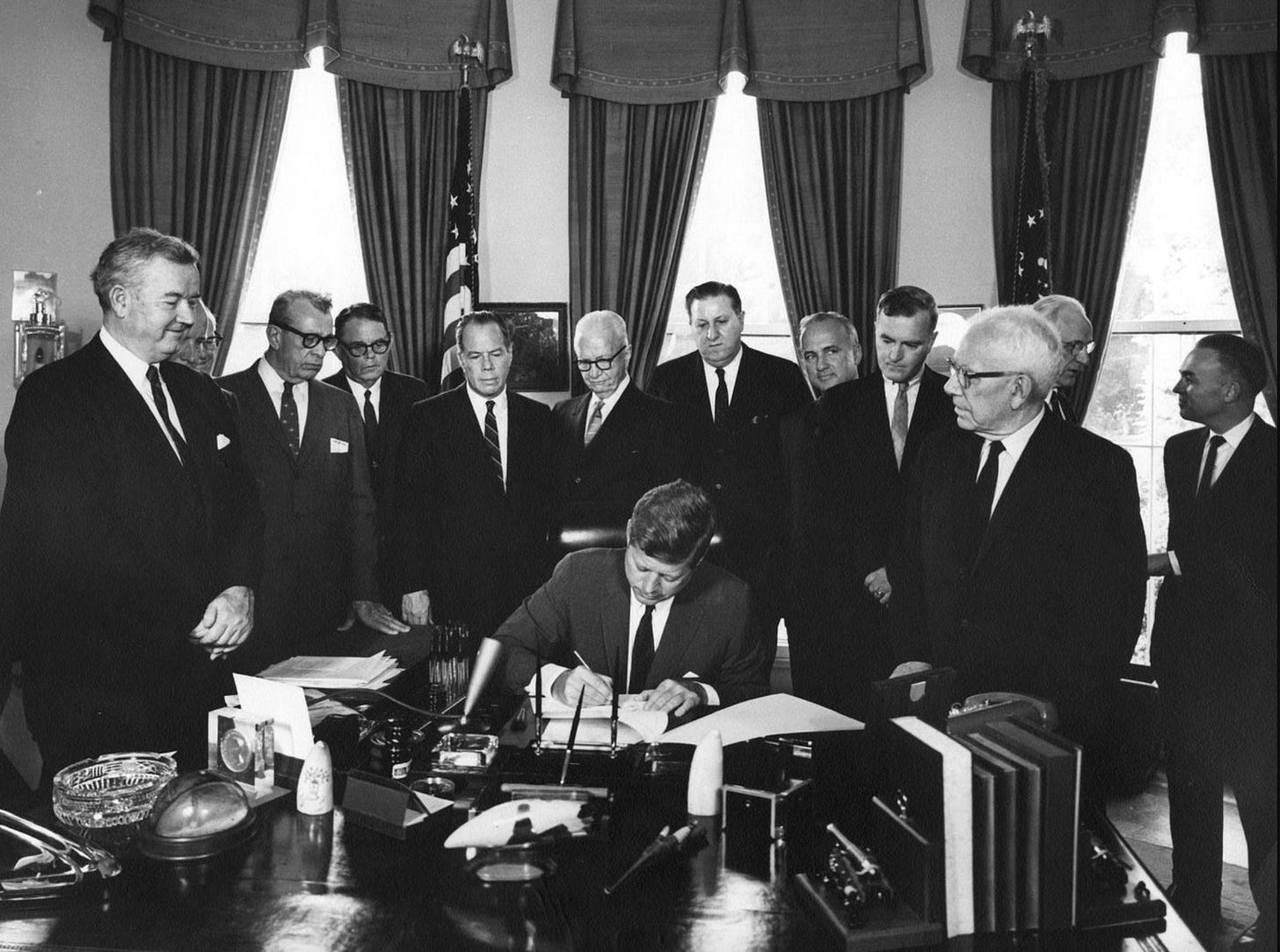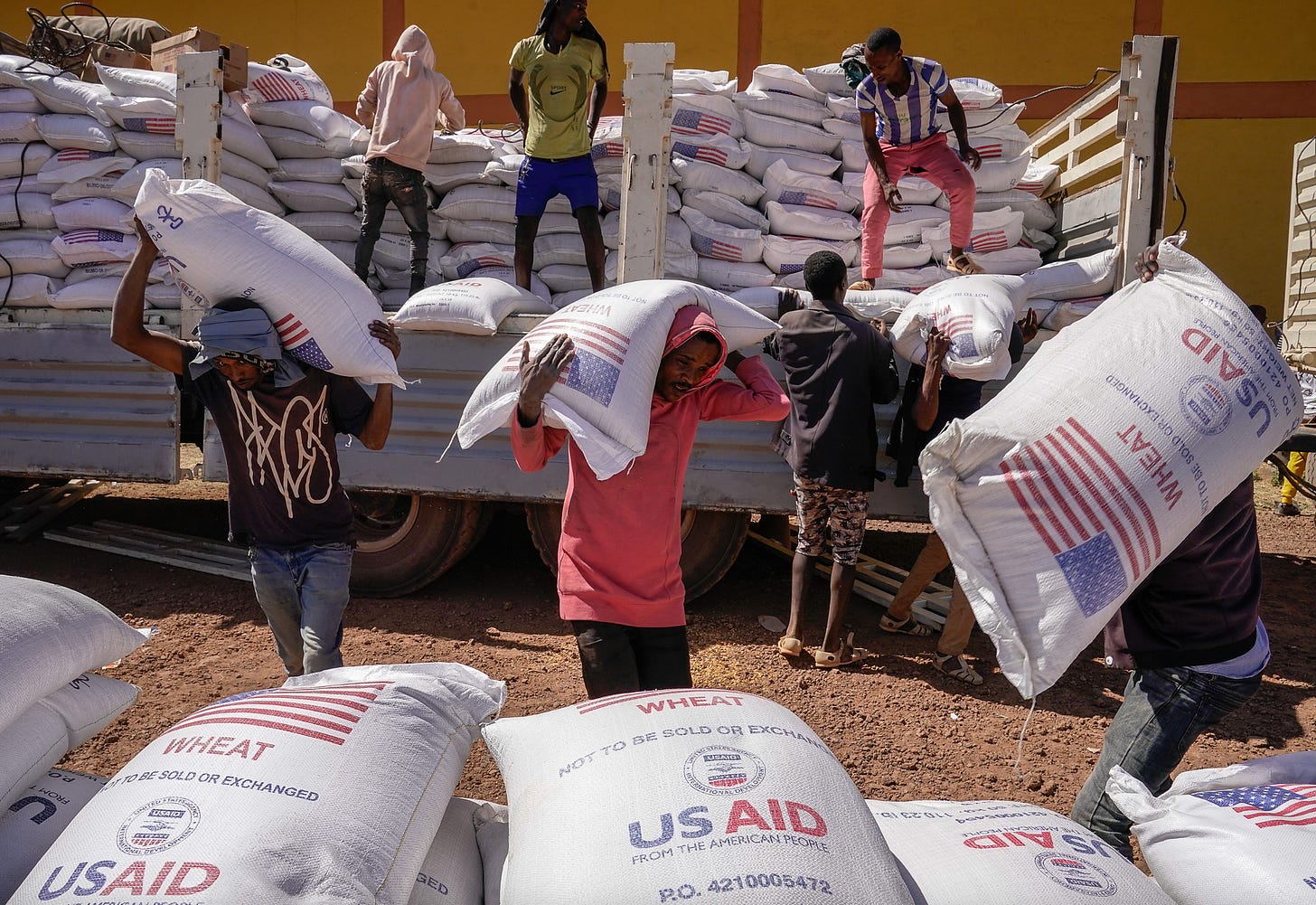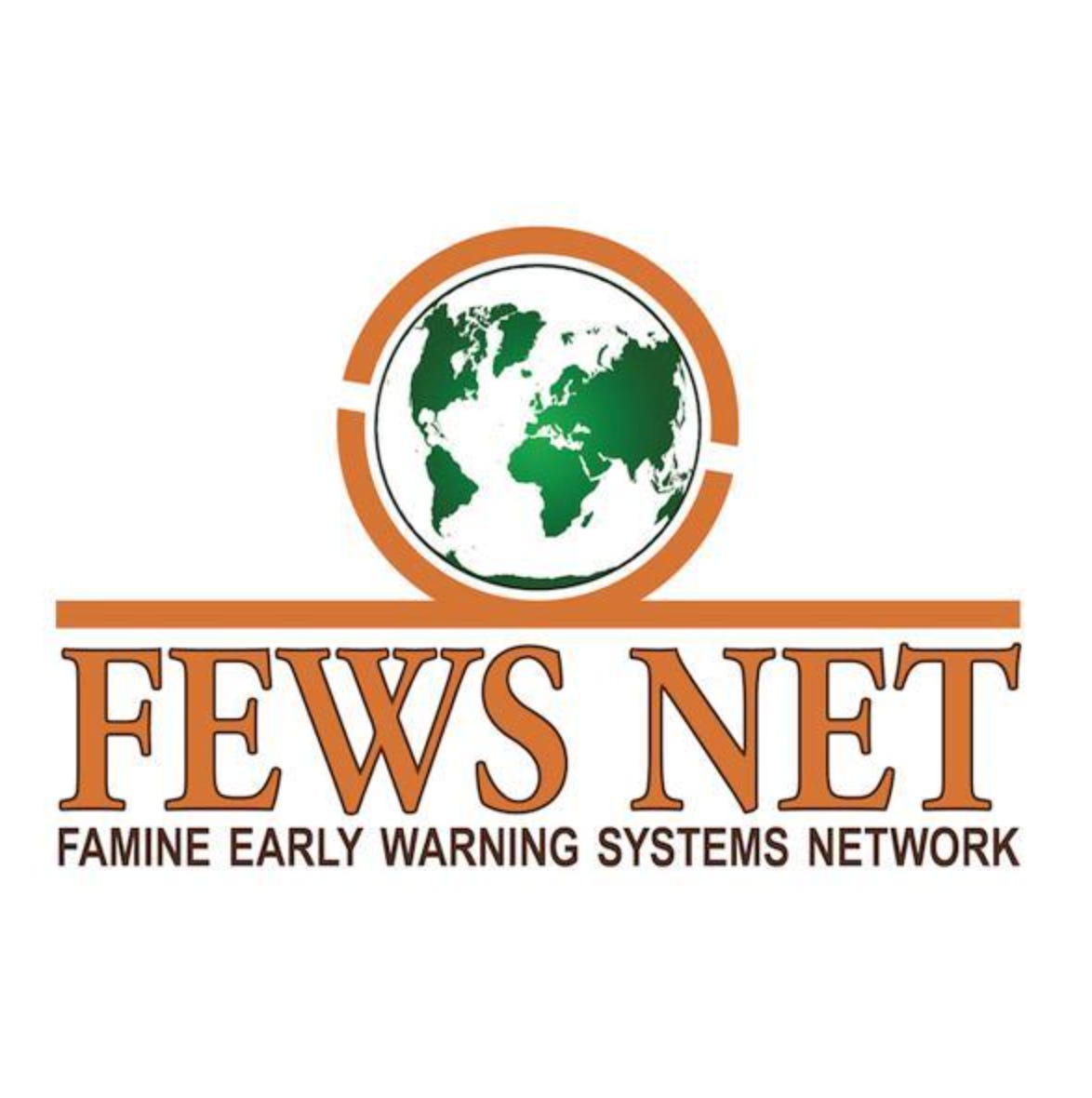Cutting “Foreign Waste” Sounds Good. Until You See the Cost
From famine warnings to countering extremism, here’s what America is really losing by gutting USAID
When President Trump addressed Congress last week, his list of "scams" and "appalling waste" in foreign assistance struck a chord with many of his supporters. After all, it's easy to question why American taxpayers should fund male circumcision in Mozambique or "social cohesion" in Mali when we have pressing needs at home.
Forty-five million for diversity scholarships in Burma? $20 million for an Arab "Sesame Street"? On the surface, these programs may sound like examples of the government waste voters elected Trump to eliminate. His administration's subsequent dismantling of USAID—putting thousands of employees on leave and freezing billions in foreign assistance—appears to Trump supporters to be simply fulfilling that mandate.
Having spent years analyzing American foreign policy across presidential administrations of both parties, I recognize that USAID has flaws. Programs like Promote in Afghanistan—which spent $280 million but helped just 55 women find better jobs—illustrate legitimate criticisms of inefficiency and waste.
But here's what's missing from this conversation: USAID isn't primarily a charity organization. It's a strategic instrument of American foreign policy, carefully developed over 60 years with bipartisan support as a cost-effective way to advance our national interests without deploying troops or imposing sanctions.
The diplomacy behind the dollars
President Kennedy understood this when he created USAID in 1961. As he told Congress, "To fail to meet those obligations now would be disastrous; and, in the long run, more expensive. For widespread poverty and chaos lead to a collapse of existing political and social structures which would inevitably invite the advance of totalitarianism into every weak and unstable area. Thus our own security would be endangered and our prosperity imperiled. A program of assistance to the underdeveloped nations must continue because the nation's interest and the cause of political freedom require it." When Kennedy looked at countries falling under Soviet influence, he recognized America needed tools beyond military force to compete for global influence.
Foreign assistance is fundamentally about leverage. When America builds a school, funds a health clinic, or provides emergency food relief, we're not just being generous - we're creating relationships and gaining influence that serve American interests. It's why successive administrations, both Republican and Democratic, have maintained USAID as a cornerstone of American foreign policy.
Take that "$20 million for Arab Sesame Street" that Trump mocked. The program doesn't just produce children's television - it delivers early childhood development to hundreds of thousands of children in regions where extremism thrives by exploiting poverty and lack of opportunity. Multiple studies have shown such investments help combat radicalization that could eventually threaten American security interests.
Or consider the "$14 million for improving public procurement in Serbia" - a program designed to bring transparency to government contracting in a region where Russia builds influence by exploiting corruption. This isn't feel-good charity; it's a calculated strategy to maintain democratic institutions in a geopolitically-contested region.
The scale and scope of dismantling
What's striking about the Trump administration's approach isn't just the decision to cut foreign aid, but the indiscriminate way it's being executed. Reuters recently reported on a 368-page document listing thousands of the canceled programs, from multimillion-dollar disease prevention efforts to contracts for interpreters worth a few thousand dollars. The sweeping nature of these cuts – from HIV prevention in the Dominican Republic to malaria eradication in Myanmar to fisheries in Ghana – suggests that we are simply abandoning these programs altogether, rather than being strategic about how to continue them.
Christian Smith, a 12-year veteran of USAID, described the policy shift this way in an op-Ed in The Guardian: "Administrative assistants were ordered to take down all the pictures of the many people the agency helps around the world as if it had been something shameful." In a particularly revealing and hurtful move, officials blocked access to the wall of names honoring those who had given their lives to the agency's mission.
The battle in the courts
The legal fight over USAID's future has reached the Supreme Court, with last week's sharply divided 5-4 decision denying the administration's request to block a lower court order prohibiting suspension of foreign aid funding. This cleared the way for nearly $2 billion in payments for work already done.
But within hours, in an effort to challenge the rejection of the temporary nature of the suspension, the administration filed a court order stating it had made final decisions on all USAID and State Department projects, canceling about 5,800 USAID
programs — over 90% of the total. This effectively keeps the issue in the courts without forcing the administration to pay the funding.
The court battles highlight something profound: the dismantling of USAID isn't just a policy disagreement but a fundamental restructuring of America's global posture. As the courts deliberate, billions in assistance remain frozen, thousands of employees are in limbo, and America's reputation for reliability hangs in the balance.
The consequences are already visible. Plan International, a global organization that advocates for children's rights, reported that "tens of thousands" of doses of essential medicine to assist malnourished children in refugee camps are stuck in warehouses in Ethiopia, far from the 75 health clinics that need them – a direct result of the funding freeze.
The cost-benefit analysis
Americans should demand efficiency and accountability in foreign assistance. But we should also understand what we're getting for our investment. USAID's entire budget represents less than 1% of federal spending – pennies on the dollar for the strategic advantages it provides.
When former Secretary of State Marco Rubio was a senator, he understood this equation perfectly, tweeting in 2017: "Foreign Aid is not charity. We must make sure it is well spent, but it is less than 1% of the budget & critical to our national security." His recent reversal as Secretary of State represents a strategic contradiction, rather than just a political shift.
This is less about politics than America's ability to shape world events without resorting to military force. When a humanitarian crisis, such as the 2021 earthquake in Haiti, destabilizes a region, America has traditionally had two options: provide assistance that helps prevent wider chaos, or eventually send in troops when the situation deteriorates. The former is invariably cheaper, both in dollars and American lives.
Or take food security. The Trump administration's USAID cuts have silenced the Famine Early Warning Systems Network, eliminating the world's most reliable food crisis monitoring system. With its website down and researchers unpaid, decades of vital data used to prevent famines in places like Sudan, Yemen, and Afghanistan has vanished overnight. Not only does famine cost lives, it is a driver of violence that leads to instability that could ultimately require U.S. military intervention.
A gift to China
The strategic cost of dismantling USAID extends beyond the immediate humanitarian impact. As America withdraws from its global commitments, others like China are already moving in to fill the void.
In Cambodia, China immediately assumed funding for a high-profile de-mining project the United States had abandoned. In Nepal, Chinese officials are already providing aid that USAID had previously delivered. In Colombia, Chinese representatives are approaching organizations previously funded by American assistance.
This pattern isn't accidental. For years, China has been expanding its global influence through its Belt and Road Initiative, a plan to build infrastructure and trade routes that connect Asia, Europe, and Africa. Now Beijing sees America's retreat as an unprecedented opportunity.
Reform, not destruction
Every administration since Kennedy has attempted reforms to improve USAID's transparency and effectiveness. But instead of targeting waste while preserving capabilities, the administration has taken a sledgehammer to an institution built over six decades with bipartisan support. Here is how Democratic Senator Jeff Merkley described the approach to reporters after meeting with administration officials: "You're burning down the village right now because you found a few termites in a post."
When Inspector General reports recently revealed that emergency food aid worth nearly half a billion dollars is now at risk of spoiling in ports and warehouses worldwide, it demonstrated this wasn't surgical reform but indiscriminate demolition.
Americans have a right to question how their tax dollars are spent on foreign aid spending. But they deserve a more sophisticated conversation than simply labeling all assistance as "waste" or "scams." The question isn't whether we can afford to maintain USAID - it's whether we can afford the strategic costs of abandoning it.
If we're serious about American leadership in a competitive world, we need to recognize that soft power isn't just charity -- it's strategy. And while the current dismantling of USAID may satisfy a political moment, the strategic void it creates won't remain empty for long.
Christian Smith remains cautiously optimistic about America's future global leadership role. In his own words: "Despite some people's attempts to reshape the US and its place in the world, we have not seen the end of American generosity… We also know that we can't make ideas go away, and the best ones – like kindness and caring for others – are actually what bind us."


